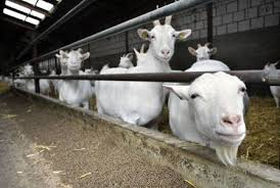Agriculture, Estonia, EU – Baltic States, Financial Services, Foodstuff, Markets and Companies
International Internet Magazine. Baltic States news & analytics
Friday, 19.04.2024, 09:09
Goat's cheese sold by new Estonian farm minister imported from Nertherlands
 Print version
Print version |
|---|
Repinski has dismissed the allegations as slander and promised to go to court.
The weekly said that goat's cheese of the Konju organic farm belonging to Repinski is sold all over Estonia. Two years ago, Repinski opened a farm store in Lembitu Street in central Tallinn with a declared aim of selling only products grown on Estonian farms and organic products, Eesti Ekspress said.
The weekly pointed out that in his first interviews as would-be minister, Repinski has promised to reach out to local farmers and assured that Estonian food and export are the topics closest to his heart.
Just a few weeks after the store was opened, the first batch of goat's cheese from the Dutch company De Molkerei arrived on the Konju farm in northeastern Estonia. Situated on the North Coast of the Netherlands, De Molkerei buys milk from the country's biggest goat farm where a thousand goats are milked every day. A spokesperson for De Molkerei, Els Hartog, confirmed that the nearby farm that they buy their milk from is not an organic farm.
Hartog said Konju has ordered cheese from them on five occasions, in amounts ranging from 50 to 200 kilograms. The weekly observed that Konju sells goat's cheese in ball-shaped pieces packaged into jars, each containing about 180 grams of cheese. With 100 kilos of cheese more than 500 jars can be filled.
The weekly said that containers with the Dutch made goat's cheese are brought to Konju, where woman workers shape the cheese into ball shapes between their hands.
Repinski said he bought goat's cheese from the Netherlands to diversify the offer. "This was part of a long-term plan. While promoting Estonian food has been our goal, it has also been a goal to showcase the various products made from goat's milk. We brought cheese from the Netherlands to diversify the product range and the possibilities offered by our Farm Store. We are planning to bring other goat's milk products from the Netherlands in the future as well," he said.
According to the agricultural registers and information board PRIA, there are 517 goats on Repinski's farm, including about 200 dairy goats. It appears from the findings of an inspection carried out by an authorized veterinarian on the farm in mid-February that there were 433 goats on the farm, including 170 dairy goats.
An Eesti Ekspress journalist who visited the farm said he saw about 50 goats.
The weekly also cites a former worker, Nikita Sahharov, who said that he had always problems getting paid when working for Repinski and that the would-be minister still owes him 1,835 euros.
Repinski said: "According to the information I have all wages have been paid as things stand now. If there are workers maintaining the opposite, they can turn to the Labor Inspectorate."
Repinski said he dismissed Sahharov in August because the employee was saying too many bad things about the farm to outsiders.
Repinski owns two businesses at this point, according to Eesti Ekspress: the Farm Store in Tallinn and the goat farm at Konju. A week before becoming minister he had one more company, Konju Moisa Talu OU, which listed farm tourism and retail trade as its areas of business. The company that has big tax arrears was co-owned by Ksenja Klotskova, Repinski's former partner.
On Nov. 16, the company changed its name to Reidi Moobliari, Estonian for Reidi Furniture Store, and Roza Nikolajeva, mother of Repinski, was registered as its mamager. The tax debt of Reidi Moobliari amounts to 7,555 euros, the weekly said.
"This article is nothing but slander and contains many incorrect allegations. I intend to go to court against Eesti Ekspress over this story and also to bring to light the anonymous sources cited in it," Repinski said on Facebook.








 «The Baltic Course» Is Sold and Stays in Business!
«The Baltic Course» Is Sold and Stays in Business!

